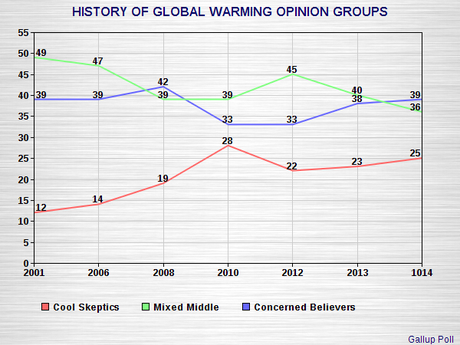
In their surveys on the global warming debate, the Gallup Poll has determined that their are three major groups in the United States -- the cool skeptics, the mixed middle, and the concerned believers. Here is how they define those three groups:
Concerned Believers and Cool Skeptics are of entirely different mindsets when it comes to how much they worry about global warming. Concerned Believers say they worry "a great deal" or "fair amount" about the issue, while Cool Skeptics worry only "a little" or "not at all." Additionally, Concerned Believers think media reports about the issue are either correct or underestimated, while Cool Skeptics think they are exaggerated. And, most starkly, 100% of Concerned Believers say the rise in the Earth's temperature over the last century is due to the effects of pollution, while 100% of Cool Skeptics say it is due to natural changes in the environment. Finally, two-thirds of Concerned Believers believe global warming will pose a serious threat to their own way of life in the future, while 100% of Cool Skeptics disagree.
Americans in the Mixed Middle are individuals who hold a combination of views. For instance, some believe humans are the cause of the Earth's warming, but aren't worried about it. Others say global warming is a natural phenomenon, but that it will pose a serious risk in their lifetime. In one way or another, those in the Mixed Middle fail to line up with the orthodoxy on either side of the climate science issue. There are two sides in this battle -- the scientists and the corporations. When the scientists (95% to 97% of them) came to the conclusion that global warming was changing the climate, that it was due to an overuse of fossil fuels by humans, and that action must be taken to prevent further damage to the environment, the corporations realized that they would soon be required to stop their polluting of the environment (and maybe even be forced to clean up the mess they've already made).They had a choice. They could either stop polluting and be good corporate citizens, or they could mount a propaganda campaign to fight the scientific conclusions -- a campaign full of lies and half-truths (and designed only to protect their huge profits). It wasn't that they couldn't afford to clean up their act. They just didn't want to do it, because the only thing they care about is today's bottom line. What the planet will be like for future generations is of no concern to the corporate moguls.
And unfortunately for those future generations (and perhaps even this generation), the corporations are winning in their propaganda battle. They have been able to generate enough doubt among the public to keep the government from acting.
As the chart above shows, the scientists have been unable to overcome the corporate propaganda and convince the public of the looming danger. The number of concerned believers was 39% at the beginning of this century (in 2001), and in 2014 it remains at 39%. Although the mixed middle has decreased by 13% since 2001, the number of concerned believers has remained the same. All of that 13% has gone to the cool skeptics group. That means the corporate propaganda has not only stunted the growth of those believing the scientists, it has increased the number of those willing to deny science.
It has become clear that government will not take effective action until a substantial majority of the public demands that action, and a majority of the public won't do that until the global climate changes are so bad that they can no longer be denied (even with corporate propaganda). Sadly, that will be too late for effective action to be taken.
Future generations (if we leave enough of a planet to sustain future generations) will look back at this generation and wonder why we didn't do anything (especially since we were warned repeatedly by all the scientists). Do you think they'll accept the argument that corporate profits had to be maximized?

